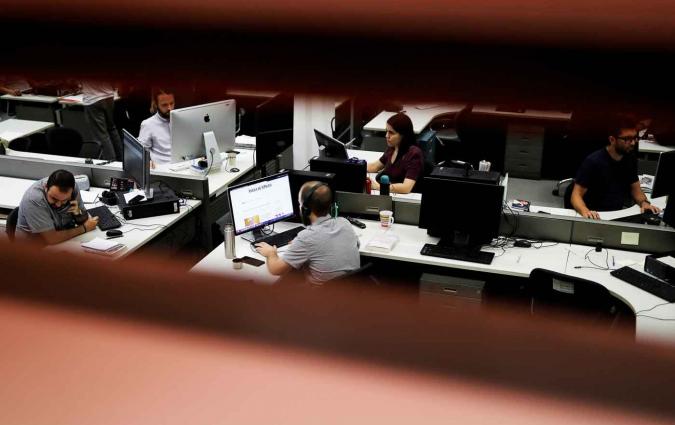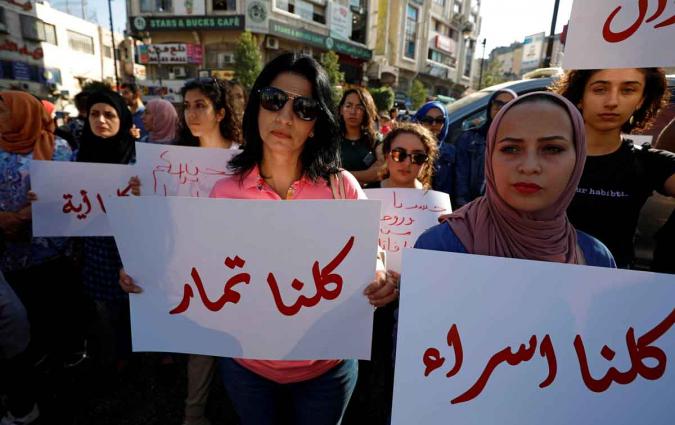In this piece
The elephant in the room: missing transgender news coverage in Jordan

In this piece
Trans issues in Jordan | What are trans issues? | Rashid’s story | Trans issues and medicine in Jordan | Trans issues and Jordanian law | Trans issues in the newsIn a world where news often aims to please the masses, some stories remain unreported, nestled in the shadows of society. This is one such story, unlikely to entirely please anyone.
For the 97% who are not transgender, the subject matter might seem foreign, unrelatable, or even heretical. Meanwhile, the 3% who identify as transgender, non-binary or other, might find this story lacking nuance or careful articulation.
At its heart though, this story is about not catering to expectations. True journalism demands that we shed light on the narratives that often remain unheard.
Trans issues in Jordan
In Jordan, trans issues remain largely absent from the news agenda. Often deemed a western concern, it's brushed aside with statements like, "It has no place in our culture, society, or religion(s)". My journalism fellowship project seeks to shatter this misconception, revealing that transgender issues transcend geographical boundaries.
Statistics from a 2023 Ipsos report, spanning 30 countries including Turkey, Singapore, Thailand, and Japan, indicate that 3% of the global population identifies as transgender, non-binary, or "other than male or female." Translated to Jordan's context, this represents a staggering 345,000 individuals among its 11.5 million populace.
This invisible community grapples with marginalisation, familial isolation, societal discrimination, and legal hurdles in Jordan. Access to medical treatment and accurate identification is a privilege denied, resulting in limited educational and employment opportunities, and a rough path to a peaceful life.
What are trans issues?
Sex and gender, often intertwined yet distinct, play pivotal roles in understanding trans issues. Sex, in medical and scientific domains, categorises individuals based on biological and physiological attributes, notably reproductive anatomy and functions.
Gender, as defined by the World Health Organization (WHO), encompasses the socially constructed characteristics of women, men, girls, and boys. It encapsulates norms, behaviours, roles, and relationships, but also manifests inequalities through intersections with ethnicity, socioeconomic status, disability, age, geographic location, and sexual orientation.
Crucially, transgender people share fundamental health needs with the broader population, yet evidence highlights their disproportionate burden of mental, sexual, and reproductive health issues. Some seek medical or surgical transitions, while others navigate alternative paths.
Rashid’s story
As a transgender Jordanian man, Rashid’s path has been fraught with obstacles. Desperate attempts by his family to conform Rashid to societal norms led him through psychiatric hospitals and consultations with specialists. Recalling his experience, Rashid said, "I stayed in a psychiatric hospital for a month... [they said] I suffered from a lack of morals."
From early education to adulthood, Rashid wrestled with societal expectations. Bullying in a mixed-gender school and an unsupportive experience in a public secondary school for girls deepened his isolation. An attempt to run away from home resulted in a broken leg and house arrest enforced by his father.
A pivotal moment emerged when a new psychiatrist told Rashid's mother that his identity would remain unchanged. Around the age of 19, his family's perspective began to shift.
Armed with new knowledge of LGBTQ+ identities, Rashid embarked on a journey to find peace. Overcoming obstacles, such as obtaining hormone therapy, he navigated a complex medical landscape with determination. He noted, "It wasn't easy to get medical help, and some doctors refused."
Undeterred by societal norms and medical barriers, Rashid pursued gender-affirming surgeries. He confronted a surgeon's hesitation, mirroring the wider challenges faced by transgender individuals in Jordan. Rashid questioned, "If I was a woman who wanted to enlarge the breast, you would not refuse... why would you not reduce them?"
Trans issues and medicine in Jordan
A 2018 report on sexual and gender minority refugees from the Middle East, North Africa, and Asia highlighted the traumas endured, including assault, psychological abuse, and ostracism, forcing some to seek asylum in the European Union due to the risk posed by their sexual orientation and gender identity.
Insights from Jordanian psychiatrist Dr. Ashraf Al-Salhi sheds light on the critical therapeutic goals for transgender individuals in Jordan: focusing on self-acceptance and suicide prevention. These objectives hold global significance, given alarming statistics revealing that 82% of transgender individuals contemplate suicide, and 40% attempt it, particularly among transgender youth.
But providing treatment, particularly surgical treatment, is risky. Dr. Suzan Bakhit, a plastic surgery specialist, highlights the limitations imposed by Jordanian laws on gender-affirming surgeries. “Some of the transgender people who came asking for help regarding surgeries to better represent their identities – like mastectomy – I can’t do anything,” she said. “[Under] Jordanian laws I can’t perform these surgeries unless there is a medical reason, like the hormones they are getting might be causing cancers in the area I want to remove. Otherwise I will face penalties and can even be taken to court.”
Trans issues and Jordanian law
Jordanian law distinguishes between sex change and sex correction operations under the Medical and Health Liability Law No. 25 of 2018. While a sex correction operation is permissible, a sex change operation is expressly prohibited under Article 8 of the same law, carrying penalties of imprisonment ranging from three to 10 years.
Most transgender individuals seek gender-affirming surgeries in other countries, including Lebanon and Thailand. When they return, they face struggles when their outward identity no longer matches their registered legal identity.
Take the case of Samih who sought legal recognition through court petitions. Jordanian courts refused to change her identity papers, citing societal values and public order as reasons to maintain the status quo.
In the realm of employment, transgender individuals encounter a lack of legal protection against discrimination, despite Jordan being a signatory of the International Labour Organisation’s Convention 111.
Police responses further compound the issue. While Jordan does not explicitly criminalise transgender individuals, other laws, such as public indecency statutes, can be used to limit their freedom. Police harassment and invasive searches have been reported, exacerbating the vulnerability of transgender individuals.
Trans issues in the news
The media's role in shaping public perceptions and attitudes towards transgender issues in Jordan is marked by challenges, missed opportunities, and sporadic progress.
Transgender Jordanians I spoke to for this report said the media had the potential to educate the public and combat online and real-life abuse they endure.
However, Jordanian media often falls short of this responsibility, contributing instead to fear, stigma, and violence against the LGBTQ+ community.
Human Rights Watch (HRW) attempted to shed light on digital targeting of LGBTQ+ individuals in the Middle East through a comprehensive report. Despite the importance of this issue, Jordanian media largely ignored the report.
Rasha Younes, a senior researcher with the LGBT Rights Program at Human Rights Watch, told me: “We anticipated that the Jordanian media and local media would not be reporting on these findings because we know that there is extreme censorship on content related to gender and sexuality in Jordan. […] We understand that the report’s findings will not find its place in Jordanian media. However, we have received better response from regional Arabic-speaking media that is covering the report and putting our findings on Jordan.”
Instead of reporting on the situation, Younes said Jordan media was more likely to air very negative views about gender and sexuality, adding to the spread of fear and perpetrating stigma, harassment, and violence against LGBT people.
Her comment is given credence by a review of reporting on a 2022 anti-transgender campaign titled “Fetrah” (Arabic for human instinct), which garnered wide coverage across digital and legacy media – even on a public service media.
When journalists do attempt to address transgender topics, they face vehement opposition. A former BBC journalist's report on a transgender individual led to a barrage of hateful comments, including death threats, and demonstrates the challenges journalists encounter in fulfilling their duty to convey minority issues.
The media's role in transforming perceptions and fostering acceptance of transgender individuals in Jordan remains a work in progress. My full project, available as a PDF below, goes into more detail on all of these topics.
Addressing these challenges is essential for creating a more inclusive and informed society.
Editor's note: Amended 21/08/23 to correct Dr. Ashraf Al-Salh's profession from "psychologist" to "psychiatrist".




